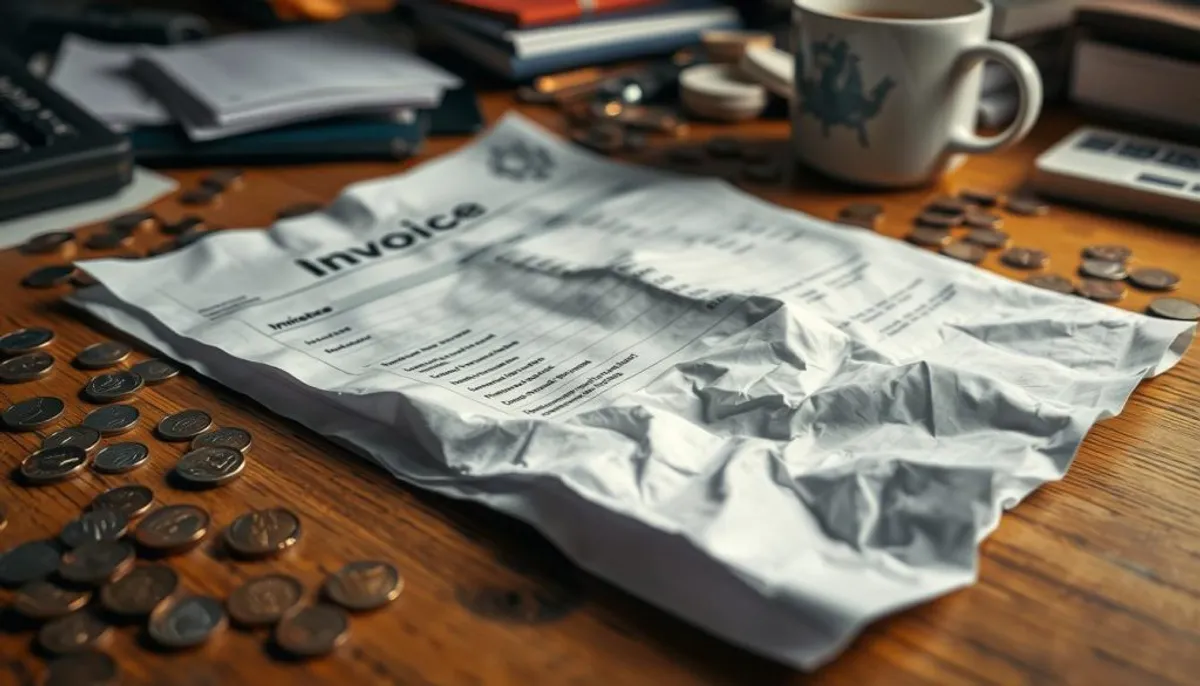If your business uses invoices, you know the pain of unpaid bills. Customers might not pay on time for many reasons, like lost bills or unexpected costs. Small business owners often find it hard to ask for payment without being seen as rude.
But, unpaid invoices hurt your business’s money flow. As a smart business owner, you must act to keep your finances healthy. This article will show you how to get customers to pay what they owe.

Key Takeaways
- Unpaid invoices disrupt your cash flow and drain valuable time and resources.
- Invoice factoring can help bridge financial gaps caused by late payments.
- Polite reminders, payment plans, and legal action are various approaches to handling nonpayment.
- Maintaining clear communication and a professional demeanor is key when dealing with delinquent customers.
- Pursuing all available options is crucial to recovering overdue payments and protecting your business’s financial health.
The True Impact of Unpaid Invoices on Your Bottom Line
Unpaid invoices can hurt your small business a lot. They can stop your cash flow, making it hard to pay for things like payroll and rent. This can even threaten your business’s survival.
Also, chasing unpaid invoices takes up a lot of your time and resources. Your team might spend hours on reminders and phone calls. This can hurt your business’s productivity and profits.
Finally, unpaid invoices can harm your customer relationships. Trying to get paid can damage your reputation. This might lose you customers, making things even worse.
The effects of invoice nonpayment are big. They can mess with your cash flow, productivity, and how you deal with customers. It’s key to tackle this problem early to keep your business strong.
Exploring Invoice Factoring as a Solution
When customers don’t pay on time, it can hurt your cash flow and business. Invoice factoring is a good way to solve this problem. It lets you sell your accounts receivable to a factoring company. This way, you can get the money you need while waiting for payments.
Pros of Invoice Factoring
- Improved Cash Flow: Factoring can give you a quick cash boost. You can get 70% to 90% of your unpaid invoices’ value right away.
- Reduced Credit Risk: Factoring companies handle the risk of late or non-payments. This protects your business from financial harm.
- Faster Funding: You can get funds through factoring in just 24 hours. This is much faster than traditional loans, which can take weeks or months.
- Flexibility: You can choose which invoices to factor. This flexibility is great for businesses with changing cash flow needs.
- Focus on Growth: With better cash flow and less risk, you can invest in growing your business. This means more opportunities for sales, new products, or services.
Cons of Invoice Factoring
- Fees and Costs: Factoring companies charge a fee, which can cut into your profits. Fees usually range from 0.5% to 4%.
- Customer Relationship Strain: Using a third-party for collections can damage your relationship with customers. This might make them unhappy.
- Qualifying Criteria: Factoring companies look at your clients’ creditworthiness, not your business’s history. This might limit who can use factoring.
Thinking about invoice factoring means weighing its good and bad sides. Choose a reputable company that fits your industry and needs. Factoring can help you manage cash flow and focus on growing your business.

Effective Strategies for Handling unpaid invoice
Dealing with unpaid invoices can be tough. But, using smart strategies can help. It’s important to be kind, professional, and open to finding solutions that work for both sides.
Sending Reminders and Making Calls
Begin by sending polite payment reminders via email or text. Invoices are 60% less likely to be paid after 90 days, so it’s key to act fast. Make sure your reminder emails are short and to the point, with a subject line under 50 characters for better open rates. Then, call the customer to talk about any problems they might be facing.
Assuming Good Intent and Finding Solutions
Think the customer wants to pay but might be having trouble. Unpaid invoices can point to bigger issues like disputes or pricing problems. Work together with the customer to find out what’s causing the delay. You might offer flexible payment plans or other payment methods like credit cards or ACH.
Offering Payment Plans
Providing various payment options can improve the customer experience and lead to quicker payments. If the customer is short on cash, suggest a payment plan that makes the amount easier to pay. This shows you’re willing to help and can keep the relationship strong.
By using good communication, focusing on the customer, and offering flexible payment plans, you can handle unpaid invoices well. This approach helps keep your relationship with customers positive.
Escalating Actions for Non-Payment
If your customer still refuses to pay, it’s time to take more serious steps. You might need to take legal action to get the legal action for unpaid invoices paid.
Formal Written Demand for Payment
Start by sending a formal letter asking for payment. This letter should clearly state the amount owed, the due date, and what will happen if it’s not paid. Be professional but firm, showing you’re ready to take collections for overdue payments if needed.
Seeking Legal Recourse
If the customer ignores the demand letter, you might have to go to court. You could file a claim in small claims court or start a lawsuit. But, think carefully about the costs and time it takes before you start.
Remember, legal action for unpaid invoices should be a last choice. Try all other options and keep talking to the customer to solve the issue without court.
Conclusion
Dealing with unpaid invoices can be really tough for small business owners. But, there’s a way out! By sending reminders on time, finding new ways to solve problems, and taking serious steps when needed, you can get paid. It’s all about being professional, keeping good records, and trying everything you can.
Handling unpaid invoices and managing cash flow are closely linked. Learning these skills will help you deal with late payments and keep your business stable. So, get ready to work hard, stay determined, and watch those unpaid invoices fade away.
Remember, “the squeaky wheel gets the grease.” With hard work and determination, you can turn unpaid invoices into paid ones. This will keep your small business growing and your cash flow strong. Here’s to your success!
RelatedRelated articles



